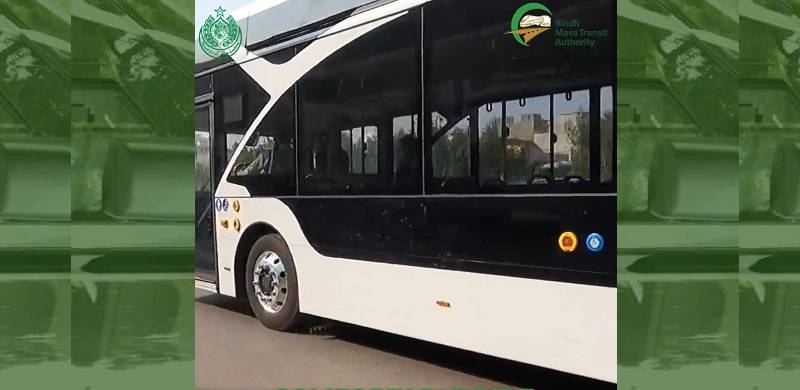
Sindh Information and Transport Minister Sharjeel Memon on Friday announced the launch of 'Pakistan's first' electric bus service, in Karachi.
Memon inaugurated the bus service at the Clock Tower, Seaview, flanked by other provincial ministers, before traveling in the bus and reviewing the facilities.
Speaking to the media, he said, "These buses will be running entirely on battery and will not spread any sort of pollution."
"Along with bringing the pollution down, the buses would allow the citizens to avail travel at low fares," the minister added.
He highlighted that those travelling to the airport can also benefit from the service. "While travelling to the airport via private cab costs around Rs1,500, "you can travel to the airport in this bus for only Rs50."
On the occasion, he thanked the Civil Aviation Authority for allowing the bus to enter the airport limits.
On the maintenance, Memon said it was up to the residents to take care of it. "We have to work together to resolve the city’s traffic woes as well as other issues."
https://twitter.com/sharjeelinam/status/1613760282588844034
According to a recent report, the strategies adopted around the globe to reduce vehicular emissions include the introduction of mass transit systems in big cities. Leaving aside the debate of route and capacity sufficiency, the only claim to fame for mass transit systems in Pakistan is their cheapness. Due to subsidised tickets, the section of the population using mass transit most frequently are students or working men and women, which is undoubtedly a positive development.
The governments must actively legislate for hourly paid parking and discourage car use by making it expensive to drive. But, to do so equitably, alternative infrastructure needs to be built first. A well-integrated network of mass transit systems must be built, and parking spots must be established at every stop for feeder buses or trains. Every road must have a dedicated cycling lane as well as a footpath for pedestrians. Cycling culture must be promoted by policy-making and not limited to recreational Sunday cycling detours. Moreover, the use of electric cycles must be encouraged by collaborating with private enterprises.
Memon inaugurated the bus service at the Clock Tower, Seaview, flanked by other provincial ministers, before traveling in the bus and reviewing the facilities.
Speaking to the media, he said, "These buses will be running entirely on battery and will not spread any sort of pollution."
"Along with bringing the pollution down, the buses would allow the citizens to avail travel at low fares," the minister added.
According to him, it will begin its journey from Tank Chowk, Malir Cantt and conclude at the Clock Tower roundabout, Seaview via Khayaban-e-Ittehad road.
He highlighted that those travelling to the airport can also benefit from the service. "While travelling to the airport via private cab costs around Rs1,500, "you can travel to the airport in this bus for only Rs50."
On the occasion, he thanked the Civil Aviation Authority for allowing the bus to enter the airport limits.
On the maintenance, Memon said it was up to the residents to take care of it. "We have to work together to resolve the city’s traffic woes as well as other issues."
https://twitter.com/sharjeelinam/status/1613760282588844034
According to a recent report, the strategies adopted around the globe to reduce vehicular emissions include the introduction of mass transit systems in big cities. Leaving aside the debate of route and capacity sufficiency, the only claim to fame for mass transit systems in Pakistan is their cheapness. Due to subsidised tickets, the section of the population using mass transit most frequently are students or working men and women, which is undoubtedly a positive development.
The governments must actively legislate for hourly paid parking and discourage car use by making it expensive to drive. But, to do so equitably, alternative infrastructure needs to be built first. A well-integrated network of mass transit systems must be built, and parking spots must be established at every stop for feeder buses or trains. Every road must have a dedicated cycling lane as well as a footpath for pedestrians. Cycling culture must be promoted by policy-making and not limited to recreational Sunday cycling detours. Moreover, the use of electric cycles must be encouraged by collaborating with private enterprises.

